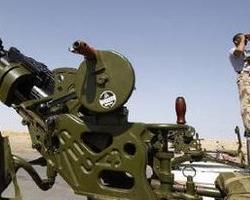The United Nations says it has been guaranteed humanitarian access to Misurata, while Britain says it will fund efforts to evacuate thousands of stranded migrant workers by boat from the besieged port city.
A Libyan official told Valerie Amos, the UN humanitarian chief, that Muammar Gaddafi's government was willing to set up "safe passage" out of the city, which remains partially in opposition hands after weeks of attacks by Gaddafi loyalists.
Amos secured the deal through talks in Tripoli, apparently pledging to up the UN presence in the capital in return for humanitarian access in other Libyan cities.
But she said that while she had received assurances the UN would be able to access the city, she received "no guarantees" of a cessation of hostilities "to enable people to move" or for supplies to be delivered. Witnesses said government forces continued to pound the area with rockets and artillery.
Andrew Mitchell, the UK's international development secretary, said meanwhile that the UK would provide £2m ($3.3m) in aid and work through the International Organisation for Migration (IOM) to charter a ship to get Egyptian and Bangladeshi workers out of Misurata.
Mitchell's comments came in New York, where he discussed the plan with UN agency chiefs.
Speaking on the BBC, he said: "The position in Misurata, which has sharply deteriorated in the last few days, means that there are 5,000 poor migrant workers caught out on the quayside ... we're going to move all of them out as soon as we can by sea."
Al Jazeera's Jonah Hull managed to reach Misurata aboard an aid ship and found a city living under the threat of bombardment and with growing shortages of food, water, fuel and electricity.
At least 20 people died while queuing for bread when Grad rockets rained down on them, Aljazeera correspondent said. Many residents have taken refuge in mosques and schools.
"There is no safe place left here," a woman from Sudan told Al Jazeera.
Many black African migrants have been living in tents on the road outside the port awaiting rescue for weeks.
"Right now we don't know what is going to happen. We are afraid we are going to die here," Ghanaian Kusi Thomas said.
Heavy weapons
Ahead of the planned British mission, almost 1,000 people were rescued from Misurata by ferry, but the IOM said that thousands more were awaiting rescue.
"The ship docked in Benghazi straight from Misurata carrying 970 passengers on board," reported Sue Turton, Al Jazeera's correspondent in Benghazi, the opposition stronghold.
"The majority were Ghanaian migrant workers, but it also had some casualities from the fighting, including a young baby girl who has gunshot wounds, we think, to the face."
In Geneva, the International Committee of the Red Cross said it had also helped 618 migrants leave Misurata on Monday.
Many of those who have been rescued are injured. An Associated Press report said that one of the opposition troops carried fragments of rockets as he disembarked late on Monday.
"I brought this to show people what's going on there [in Misurata]. Somebody has to do something about it," 38-year-old Ali Milad, was quoted as saying.
The Libyan government has denied firing heavy weapons, including rockets and tank shells, at the city, but has turned down repeated requests by foreign journalists based in the capital of Tripoli to go to Misurata.
The opposition troops control much of eastern Libya, including Benghazi, and have done so since the uprising against Gaddafi began in mid-February.
On Monday, opposition troops consolidated their control of Ajdabiya as a sandstorm which had restricted NATO operations in the skies overhead and allowed pro-Gaddafi forces to advance on the town cleared.
Gaddafi forces withdrew and hunkered down some 40 kms from the town, Al Jazeera's Mike Hanna reported. Opposition forward units were pulled back to clear space for NATO air strikes, our correspondent said.
European diplomacy
Meanwhile in the leader of the Libyan Transitional Nation Council has been meeting Italy's foreign minister over the future of the country.
Mustafa Abdel Jalil said he would favour international ties "above all" with France, Italy and Qatar - the three countries that have recognised Libya's opposition, and that foreign policy would remain the same if it came to power.
But he said the way foreign revenue is distributed would change.
"There will be friendship and cooperation above all with Italy, France and Qatar," he said after talks with Franco Frattini.
"Our economic future will involve those who have supported us," he said.
Franco Frattini said Western and Middle Eastern states would meet in Rome next month to seek ways of realising oil revenue for the Libyan opposition.
UN sanctions, designed to constrain Gaddafi, have prevented opposition from selling oil to raise funds themselves.
So far, the opposition have only been able to export small quantities of oil with the help of Qatar.
Frattini said Rome remained opposed to sending ground troops to Libya, although the European Union said it is a move they are considering.
PHOTO CAPTION
An opposition fighter looks through binoculars as he mans a mounted anti-aircraft gun atop a pick-up truck, at the frontline along the western entrance of Ajdabiyah April 14, 2011.
Al-Jazeera


 Home
Home Discover Islam
Discover Islam Quran Recitations
Quran Recitations Lectures
Lectures
 Fatwa
Fatwa Articles
Articles Fiqh
Fiqh E-Books
E-Books Boys & Girls
Boys & Girls  Ramadan
Ramadan Fatwa Audios
Fatwa Audios Month of Mercy
Month of Mercy Women
Women Eed Al- Fitr
Eed Al- Fitr Food Recipes
Food Recipes Videos
Videos

 Prayer Times
Prayer Times












